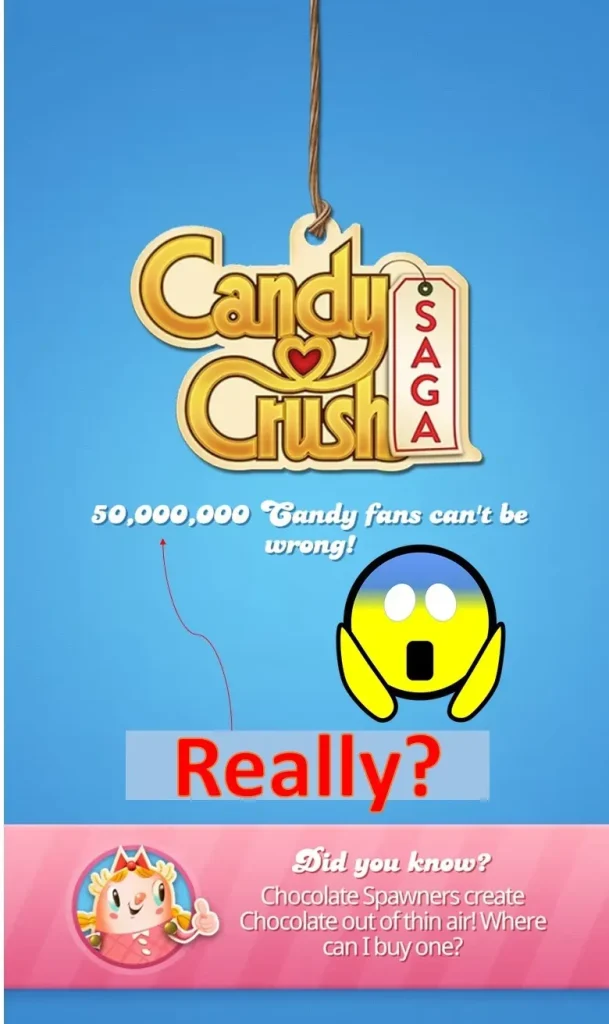Candy Crush addiction has swept across mobile gaming platforms, captivating millions with its vibrant colors and sweet gameplay. What began as harmless casual gaming has transformed into a phenomenon that many find impossible to escape. Players often lose track of time as they swipe and match their way through thousands of candy-themed levels, each designed to keep you hooked. The allure of Candy Crush Soda Saga, with its engaging mechanics and social elements, has sparked discussions about the rising issue of gaming addiction. For those seeking strategies to break free, Candy Crush tips may provide a glimmer of hope amidst the enticing chaos.
The obsession with Candy Crush and similar mobile games reflects a broader trend in digital entertainment, where players are ensnared by the thrill of match-three mechanics and appealing visuals. This growing fascination raises questions about the implications of casual gaming on our daily lives and social interactions. Many people find themselves checking their phones more often to engage in this addictive pastime, leading to a cycle of compulsive play. With strategies designed to unlock hidden potential and progress through levels, players may unknowingly spiral into the depths of gaming addiction. As we delve deeper into the world of enticing puzzles and the instant gratification they provide, it’s essential to examine the impact of such games on our lifestyle and well-being.
The Rise of Candy Crush Addiction
Candy Crush addiction is a phenomenon that has taken the mobile gaming world by storm. This game, developed by King, not only captivates users with its colorful graphics and engaging mechanics, but it also taps into psychological aspects of gaming by leveraging reward systems. Players are continuously rewarded with points, achievements, and new levels, keeping them hooked and eager to play just one more round. This concept of continuous engagement is often referred to as a ‘loop,’ and it serves as a powerful driving force behind the game’s addictive nature.
As players progress through levels, they encounter a well-crafted blend of easy and challenging tasks, designed specifically to entice them to spend money on power-ups and extra lives. The allure of achieving the next milestone, combined with the ability to instantly share progress with friends, fosters a competitive environment that fuels the urge to play more. In essence, Candy Crush has created a social ecosystem around its gameplay that makes it difficult for individuals to step away, leading to a slippery slope of gaming addiction that can affect both personal lives and relationships.
Understanding Gaming Addiction in Casual Gaming
The discussion surrounding gaming addiction has become increasingly relevant in today’s mobile gaming era, where titles like Candy Crush Soda Saga capitalize on user engagement. Casual gaming may seem harmless on the surface, but the compulsive nature of these games often leads individuals down the path of addiction. As with any addiction, it involves a loss of control over the gaming experience, and Candy Crush exemplifies this with microtransaction mechanics that offer players a way to bypass difficult levels for a price.
Moreover, the gamification of everyday life through casual games amplifies this issue. Users find themselves playing while at work, during social gatherings, and even in bed, which can diminish the quality of life and personal relationships. It’s critical to recognize the signs of gaming addiction, such as feeling restless when away from the game or needing to play for longer to achieve the same level of satisfaction. If left unchecked, these habits can lead to significant consequences in both personal and professional realms.
The Mechanics Behind Candy Crush’s Allure
One of the primary reasons Candy Crush captures so many players’ attention is its carefully designed gameplay mechanics. The game introduces vibrant visuals and satisfying sounds that provide immediate feedback, reinforcing the behavior of playing to achieve success. The reward system is enhanced by creating patterns and explosions of candy that stimulate the brain’s pleasure centers, making failure feel frustrating yet compelling. It’s a cycle that players feel compelled to break, prompting them to keep playing until they succeed.
Additionally, the game is structured around incremental difficulty, where early levels serve as mere tutorials, gradually increasing in complexity. This tactic ensures that players remain engaged, often leading to the spending of time and money in pursuit of elusive power-ups. The emotional highs from completing difficult levels, and the temptation of ‘just one more game’, combine to make Candy Crush more than just a simple mobile game; it becomes a significant aspect of players’ daily routines.
Navigating the World of Mobile Gaming
In the vast landscape of mobile gaming, Candy Crush represents just one example of a successful title within the casual gaming genre. The mobile gaming industry has exploded over the past decade, with millions of players engaging in various gaming apps for entertainment. Understanding how these games are marketed and monetized is essential for anyone looking to navigate this competitive environment, particularly as a player.
Developers utilize strategies that take advantage of users’ tendencies to connect with friends and seek validation through achievements and rankings. As a result, players are drawn into a cycle of gaming that can detract from their everyday activities and responsibilities. For those looking to maintain a healthy relationship with mobile gaming, it’s crucial to establish personal boundaries and recognize when casual gaming turns into compulsive behavior.
The Psychological Impact of Candy Crush
The psychological impact of Candy Crush is significant, as the game employs tactics that evoke feelings of satisfaction, frustration, and even guilt. Many players report an initial rush of excitement when they successfully clear levels and unlock new challenges. However, as the levels progress and become more difficult, the game can lead to feelings of inadequacy, particularly when players compare their achievements to those of friends, inducing a sense of competition that can be detrimental.
Moreover, the game’s mechanism of encouraging frequent play with enticing notifications and new level releases often results in anxiety amongst players. They fear missing out on challenges or promotions, fostering a compulsive behavior to remain engaged. Understanding these psychological effects can help gamers recognize unhealthy patterns in their playing habits and encourage healthier gaming experiences. Awareness is the first step toward addressing these underlying issues.
The Role of Social Connections in Gaming
The social aspect of Candy Crush cannot be overlooked, as it intertwines personal connections with gaming. Many players share their accomplishments and seek help from friends to complete difficult levels, making it more than just a solitary experience. This community can enhance the gameplay, providing motivation to continue playing, but it can also serve as a double-edged sword. Engaging with others on platforms like Facebook for in-game benefits can pressure players to perform better, which may exacerbate feelings of inadequacy and addiction.
Furthermore, the social sharing features encourage players to actively compare their gaming stats with friends, creating a competitive environment that can heighten gaming addiction. The need to remain in sync with this social circle can lead players to prioritize gaming over more meaningful interactions, impacting real-life relationships. This becomes increasingly problematic when the game starts to dominate daily routines and replaces genuine social interactions.
Candy Crush vs. Traditional Gaming
When comparing Candy Crush to traditional gaming experiences, such as console and PC games, significant differences emerge in terms of how they engage the player. Traditional games often provide rich narratives, character development, and complex mechanics, while Candy Crush focuses purely on addictive gameplay loop without narrative depth. This shift toward simplicity can create an empty feeling for players who might crave a more fulfilling gaming experience.
Moreover, traditional gaming experiences tend to require larger commitments of time and attention, preventing players from casually engaging away from their consoles. Smartphones, on the other hand, have made games like Candy Crush accessible anywhere, leading to longer cumulative playtime. This shift has significant implications on how gamers perceive value in their gaming experiences; many might end up deriving less satisfaction from the quick bursts of gameplay offered by mobile games, consequently leading to a deeper search for substantial gaming experiences.
Managing Time While Playing Candy Crush
Time management becomes a crucial factor when engaging with games like Candy Crush. Given the game’s design, it is easy to lose track of time while striving to advance through a challenging level or chase the elusive high score. Players often find themselves justifying extended play sessions, convincing themselves that it’ll only take a little longer or just one more turn to achieve their goals. Setting strict time limits before opening the app can help mitigate the risk of long gaming sessions.
Creating healthy gaming habits can enhance the enjoyment of Candy Crush without sacrificing other important commitments. Players can employ techniques such as setting a timer for gaming sessions or using reminders to take breaks. Additionally, being mindful of when and where to play can transform the experience from a potential mindless activity into an occasional, fun escape. This approach allows gamers to indulge in their favorite candy-matching saga while maintaining a balance in their daily lives.
Finding Help for Candy Crush Addiction
If you or someone you know is struggling with Candy Crush addiction, seeking help is a crucial step toward reclaiming control over one’s time and activities. Many organizations provide support and resources for individuals experiencing gaming addiction with strategies for reducing playtime and reintroducing more balanced routines. These resources can guide players in understanding their gaming habits, recognizing triggers of excessive play, and finding healthier alternatives.
Therapists and counseling services specializing in addiction can also be instrumental in helping individuals navigate their gaming challenges. Group therapy sessions offer a space for sharing experiences among peers in a similar boat, while also fostering accountability and encouraging healthier gaming practices. Remember, acknowledging the issue is the first step, and taking action can lead to a more fulfilling lifestyle beyond the screen.
Frequently Asked Questions
What are the signs of Candy Crush addiction?
Signs of Candy Crush addiction include playing for extended hours, neglecting responsibilities, and feeling anxious when unable to play. If you find yourself prioritizing Candy Crush Soda Saga over social interactions and daily activities, it may be time to reflect on your gaming habits.
How can I overcome Candy Crush addiction?
To overcome Candy Crush addiction, set time limits on your gameplay, uninstall the game if necessary, and seek alternative activities that provide entertainment. Engage in hobbies outside of mobile gaming and consider joining support communities for gaming addiction.
Is Candy Crush Soda Saga harmful to mental health?
While casual gaming can be enjoyable, Candy Crush Soda Saga can lead to negative mental health effects like anxiety and frustration, especially when players feel compelled to continue progressing. Balance mobile gaming with other fulfilling activities to maintain well-being.
What strategies can help improve at Candy Crush?
To improve at Candy Crush, familiarize yourself with its mechanics and utilize power-ups wisely. Focus on creating combinations of candies and pay attention to board configurations. Research Candy Crush tips online for advanced strategies to enhance your gameplay experience.
Why is Candy Crush so addictive?
Candy Crush’s addictive nature stems from its engaging mechanics, colorful visuals, and rewarding gameplay loop. The game utilizes psychological triggers, such as goal-setting and gradual difficulty increase, to keep players invested, while microtransactions create a sense of urgency to progress.
Can playing Candy Crush Soda Saga lead to gaming addiction?
Yes, playing Candy Crush Soda Saga excessively can lead to gaming addiction. Its design encourages frequent engagement and spending, making it easy to lose track of time. Being aware of your gaming habits is essential to prevent falling into the cycle of compulsive mobile gaming.
How does Candy Crush compare to other casual gaming experiences?
Candy Crush Soda Saga is unique in its colorful mechanics and addictive gameplay, but it’s similar to other casual games in that it offers quick bursts of entertainment. However, it can also lead to a heightened sense of dependency compared to games with deeper narratives and player investment.
What are the broader implications of gaming addiction like that seen in Candy Crush?
Gaming addiction, including addiction to Candy Crush, can lead to significant impacts on personal relationships, productivity, and mental health. Understanding these implications is crucial for individuals who find themselves spending more time on mobile gaming and neglecting real-life interactions and responsibilities.
| Aspect | Description |
|---|---|
| Gameplay Mechanics | The game has enticing mechanics that draw players in, featuring colorful candies and rewarding visuals. |
| Time Consumption | Players often find themselves spending excessive amounts of time on the game, potentially missing important events. |
| Addiction Factor | Candy Crush is highly addictive, designed to encourage microtransactions and prolong gameplay. |
| Comparison with Gambling | While not technically gambling, the game encourages players to go for ‘just one more turn’, similar to gambling behavior. |
| Critique of Value | Despite it being engaging, the game lacks story or significant achievements, making its value questionable. |
Summary
Candy Crush addiction is a serious challenge that many players face, often leading them to lose track of time and responsibilities. The enchanting visuals and addictive gameplay can easily ensnare anyone, turning what may start as a casual pastime into a significant distraction. It is crucial for players to be aware of their gaming habits and recognize when fun turns into an obsession. Taking control and limiting playtime might help in regaining balance in life.



